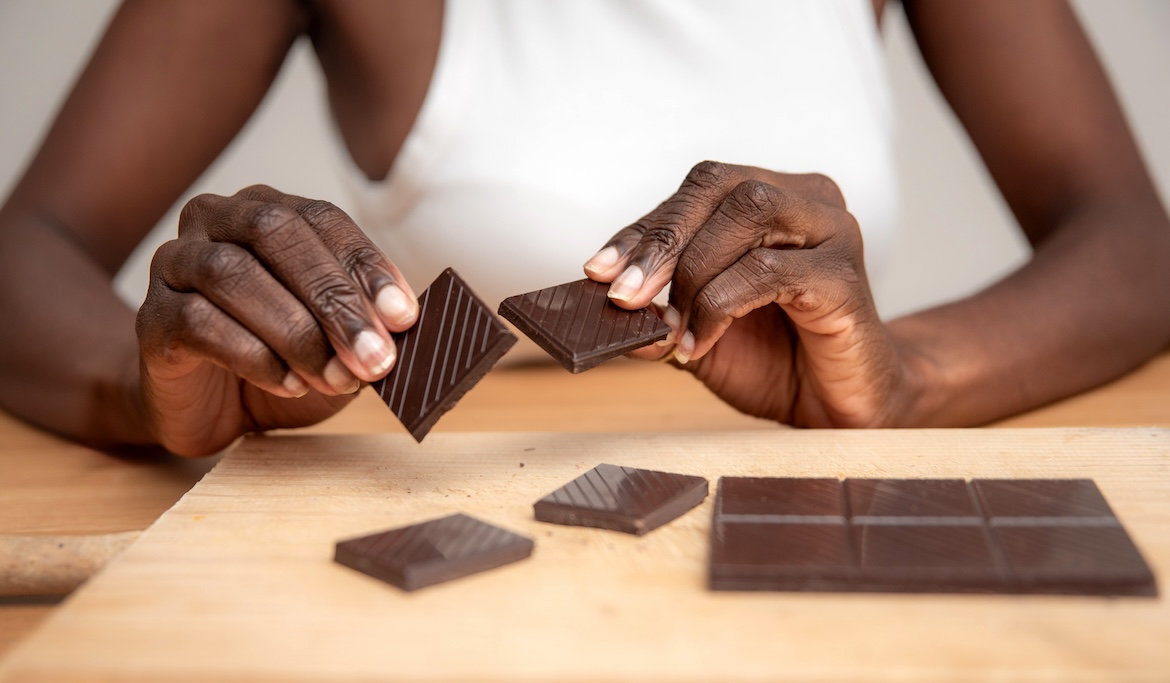Of course, type 2 diabetes is a complex condition, and chocolate is usually thought of as a delicious (rather than nutritious) food, so it’s no wonder this finding seems unexpected. Here are the findings and what might be behind the link:
What did the study find?
The study, published Dec. 4 in BMJ, analyzed data from three longitudinal studies: the Nurses’ Health Study, the Nurses’ Health Study II, and the Health Professionals Follow-up Study. As part of these early studies, participants completed questionnaires about what they ate every four years, and these surveys continued for 25 years.
Of the approximately 192,000 people who said they ate chocolate, those who said they ate 1 ounce of any type of chocolate at least five times a week had a higher risk of type 2 diabetes than those who said they ate chocolate. researchers found that 10% lower. I rarely or never ate chocolate. The researchers asked participants to report their type 2 diabetes diagnosis in a future survey, and confirmed symptoms through glucose levels, HbA1c (a blood test that measures the average blood sugar level over the past two to three months), and symptoms. . Treatment for type 2 diabetes.
When researchers took a closer look at the types of chocolate people prefer, they found that those who said they liked milk chocolate did not have a significantly lower risk of diabetes. However, there is an even more surprising discovery. People who consumed 1 ounce of dark chocolate at least five times a week had a whopping 21 percent lower risk of developing type 2 diabetes. It also caused no long-term weight gain compared to milk chocolate.
But doesn’t chocolate raise blood sugar levels?
You may be wondering, “Doesn’t chocolate contain a lot of sugar?” The simple answer is “Yes, it is possible.” However, the amount of sugar and the potential for chocolate to significantly raise blood sugar levels usually depends on the type of chocolate you eat. “Dark chocolate typically contains more cocoa solids and less sugar than milk chocolate,” explains Scott Keetley, RD, co-owner of Keetley Medical Nutrition Therapy. . “This means that dark chocolate has a lower glycemic index and is less likely to cause sudden spikes in blood sugar levels.”
Dark chocolate also contains more cacao, the raw form of chocolate, he points out. But because milk chocolate has more sugar and less cocoa, it can cause blood sugar levels to rise “faster and more noticeably,” Keatley added.
But there may be more to it than sugar, says Christoph Buettner, M.D., chief of endocrinology at Rutgers Robert Wood Johnson Medical School. “Dark chocolate contains high concentrations of flavonoids, particularly catechin and epicatechin, which have antioxidant and anti-inflammatory properties,” he says. “These compounds can improve insulin sensitivity, increase blood flow, and reduce oxidative stress, all of which play a role in reducing risk factors for type 2 diabetes.”
This is not the first study to examine the link between small amounts of dark chocolate and health. A study published earlier this year found that dark chocolate was “significantly associated” with a lower risk of high blood pressure. Other studies have found that the flavanols (a type of flavonoid) found in dark chocolate may help prevent heart disease and even improve brain performance.
But it’s also worth noting that a randomized controlled trial published last year in Diabetes Care found that cocoa consumption had no effect on type 2 diabetes risk or prevention. The latest study, which found a more significant link between dark chocolate and diabetes risk, also depended on whether participants remembered what they ate, and memories may be fabricated or misremembered. It’s possible, Keatley said.
In the end, Dr. Bütner says that while the latest findings are interesting, he emphasizes that more research is needed.
conclusion
Dark chocolate may have health benefits, including lowering your risk of developing type 2 diabetes, but it’s important to keep it in moderation. “Dark chocolate is high in calories and often contains added sugars and fats, which can lead to weight gain and an increased risk of diabetes if consumed in excess,” explains Dr. Buettner.
However, it is important to remember that chocolate alone cannot prevent the development of diabetes. “Just adding dark chocolate to an unhealthy diet probably won’t lower anyone’s risk of type 2 diabetes,” says Keri Gans, RDN, author of The Small Change Diet. “You’re more likely to see results if you eat an overall balanced diet that includes lots of vegetables, healthy fats, adequate protein, and an active lifestyle.”
If you’re concerned about your risk for type 2 diabetes, experts recommend focusing on incorporating nutritious foods into your meal plan and making time for regular exercise. But it’s also good to know that consuming small amounts of delicious treats like dark chocolate every day can definitely impact your health as well.
Well+Good articles reference scientific, reliable, up-to-date, and robust research to support the information we share. Trust us with your health journey.
Liu B, Zong G, Zhu L, Hu Y, Manson JE, Wang M et al. Chocolate intake and risk of type 2 diabetes: a prospective cohort study BMJ 2024; 387 :e078386 doi:10.1136/bmj-2023-078386 Yang, Juntao et al. “Dark Chocolate Consumption and Cardiovascular Disease: A Mendelian Randomized Study” Scientific Reports vol. 14,1 968. January 10, 2024, doi:10.1038/s41598-023-50351-6 Gratton, Gabriele et al. “Dietary flavanols improve cerebral cortical oxygenation and cognition in healthy adults.” Scientific Reports vol. 10,1 19409. November 24, 2020, doi:10.1038/s41598-020-76160 -9 Li, Jie et al. “Cocoa Extract Supplementation and Risk of Type 2 Diabetes: Cocoa Supplements and Multivitamin Outcomes Study (COSMOS) Randomized Clinical Trial.” Diabetes Care vol. 46,12 (2023): 2278-2284. doi:10.2337/dc23-1012
These products are independently selected by our editors. When you buy through our links, Well+Good may earn a commission.

